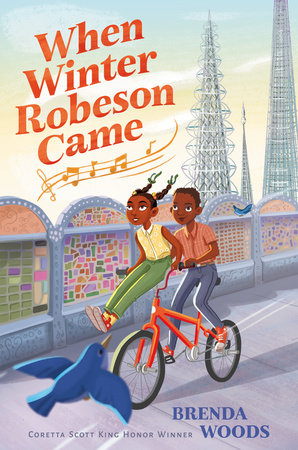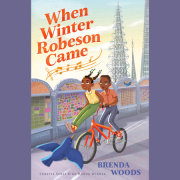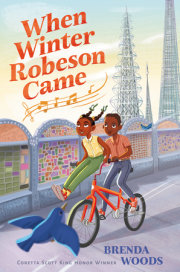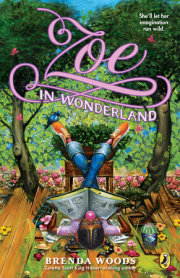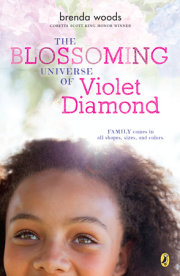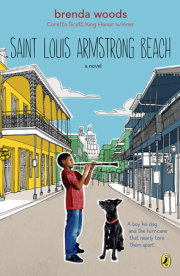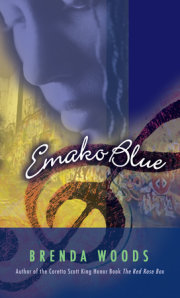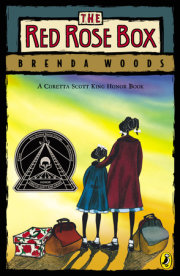Unexpected Endings When my cousin, Winter Robeson, came, I figured
it would simply be two weeks of summertime fun.
But every now and then it seems like songs with unexpected endings:
things don’t always turn out the way you thought they would.
August 1965 wound up becoming
exactly like one of those songs.
A Volcano Erupts
The melody began harmoniously.
Instantly, Winter and I became a duo, our ballad a duet.
But it wasn’t long before the tempo of our song changed.
Poco a poco—little by little—the music veered off course,
becoming an improvisation, spontaneous, unrehearsed.
Then, suddenly and without warning, the city of Watts,
which people claim was a volcano aching to erupt,
finally did.
Free-Flowing Melodies
Eden, Eden Louise Coal, is my name.
I’m twelve, going on thirteen.
I live on 103rd Street in Los Angeles, California,
just west of Figueroa, not too far from Watts.
Something else I suppose you should know
is that I plan to become a songwriter, and so
my words often pour out in cascading streams,
sounding like free-flowing melodies.
His Arrival
It’s a summertime Thursday, August 5, 1965.
We’re downtown at Union Station, Daddy and I,
sitting inside on one of the long, cool wooden benches, waiting.
Now and then a train unloads and passengers stream out.
Hands begin waving, and people hurry toward each other,
smiling, reaching out arms, hugging, sometimes kissing.
His train arrives late, but then there
he is.
All the way from Sunflower, Mississippi,
birthplace of Jerry Butler, Daddy likes to brag.
Been two years since I last saw him
at our family reunion in Indianola, Miss.
I glance up at him, thinking, He sure grew tall,
and that makes me feel small.
He’ll be fourteen this December,
our cousin, Winter Robeson.
I’m Eden, I blurt.
I know. You ain’t changed ’cept you got a lot shorter, Winter Robeson jokes.
I laugh.
Did not, I tell him, then examine him from head to toe.
The straw cowboy hat looks small for his head,
and for some reason that makes me smile.
Between his front teeth a gap has appeared
and his perfect velvety skin is dark brown.
His suitcase Mama would call well used.
His plaid shirt is green, his jeans brand-new-blue.
His black high-top Converses have snowy white laces,
and from his neck a Kodak camera loosely dangles.
We trail my daddy, Ernie Coal, outside into the sun.
From the front seat of our ’57 Chevy, I keep turning around, gazing,
sipping him slowly like ice water, memorizing him like a poem.
Y’all even have your own automobile. Wish we had one, Winter remarks,
caressing the seat, acting like he’s riding in a brand-new Cadillac Coupe de Ville.
I turn on the radio and music fills the car.
Marvin Gaye is singing, “I’ll Be Doggone,” and I sing along.
Immediately, Winter joins in and together we croon.
When the song ends, Winter begins snapping pictures,
Click, click, click.
California, he softly says, making it sound like heaven.
It gets in your blood after ’while, Daddy confesses.
Not like Mississippi, but it does. And right then, once again, I begin to long
for the country roads and folks of Indianola, Miss.
where I was born and raised till I was ten.
Missing Her and Mississippi
Mississippi,
where trios of songbirds serenaded me in the morning,
and lightning bugs added sparkle to summertime nights.
Mississippi,
where I spent Sundays singing old-time hymns,
in our tiny white wooden church with the pipe organ,
and Saturdays taking piano lessons from Miss Elvira Porter.
Miss Elvira Porter, her hands wrinkled but fingers still nimble,
taught me how to read notes and play,
plus, musical symbols and terms galore.
I’m not sure if she planted the seed of music in me
or if it was already there just waiting for her to cultivate.
From her creaky porch swing, where she and I loved to linger,
she spoke of Negro women composers,
like Margaret Bonds and Julia Perry,
writers of spirituals, sonatas, symphonies, even operas,
and trained me to hear life’s orchestra.
Hear that, Eden? she asked.
Hear what?
The whip-poor-wills singing, the dog barking in the distance,
the gentle breeze rustling the leaves of the cypress trees.
Now the train, hear it rolling along the tracks?
Getting louder . . . crescendo . . . shh, softer now . . . decrescendo.
There’s the train’s conductor, his horn a-blowing.
Finally, the climax, my teakettle inside whistling.
It’s a beautiful composition, wouldn’t you say?
I would, yes ma’am, I would. Missing her and Mississippi makes me sigh.
And I ache for it even more with Winter nearby.
The tone of his voice, the warmth of his smile, bring me back.
And for the thousandth time I wish we’d never left.
103rd Street
Our house looks pretty with its square patch of emerald green lawn, freshly mowed.
Pink geraniums are blooming, and the picture window is Windex clean.
Inside, everything is what my daddy calls spic-and-span,
and Mama has fixed things up especially nice,
the way she always does for visits from folks back home.
It’s like Mama’s bound and determined to wash off her country beginnings
as if they’re a stain and a life in California is a fancy detergent,
guaranteed to get rid of it, once and for all.
Mama steps onto the front porch.
Her lipstick is red, hair freshly pressed and curled,
green and white polka dot sundress, starched and perfect.
Grinning and waving, she rushes to the car,
my mama, Ruby Coal.
Mama hugs Winter so tightly that a laugh pops up out of him.
As handsome as your daddy, J.T., she says, her voice sounding sweet—dolce.
I notice that Mama’s mention of his daddy, who disappeared
and is likely dead, changes Winter’s eyes from happy to sad.
Yet still, he politely replies,
Thank you, Miz Ruby.
It’s so nice to have you here, Winter, Mama tells him.
His face brightens, and again he says,
Thank you, Miz Ruby.
It’s most kind of y’all to have me.
The Gum Smacker
The next-door neighbor’s screen door opens,
its usual squeal turning our attention its way.
Hi, Mr. and Miz Coal . . . and Eden, she adds reluctantly,
as if I’m insignificant, the way she always does,
gum smacking, fifteen-year-old, thinks-she’s-a-Hollywood-movie-star
Cassie Webber.
Mama and Daddy give a courteous reply and head inside.
Then Cassie Webber blows a huge, perfect pink bubble, pops it with her finger,
and as if he’s a blinking neon sign, stares at my cousin, Winter.
Who are you? she asks.
I
’m Eden’s cousin, Winter.
Did you say Winter?
Yes, I did, he tells her.
What kind of a name is that?
The one my daddy gave me, born the first day of Winter is why.
Oh, she says.
That’s strange but kinda cool. And as she gazes at Winter,
I swear I see stars in the gum smacker’s eyes.
As we make our escape, Winter confides,
She’s just sayin’
what most folks think ’bout my name being strange, I mean.
Even my buddies poke fun and tease,
“Put your coats on, y’all, ’cuz Winter’s comin’ and I feel a breeze.” I smile and so does he.
Copyright © 2022 by Brenda Woods. All rights reserved. No part of this excerpt may be reproduced or reprinted without permission in writing from the publisher.

